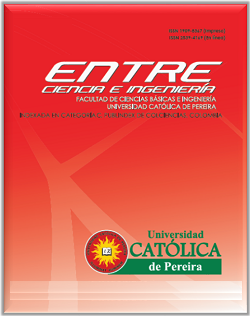Integral use of simulation, design of experiments and KANBAN to evaluate and improve the performance of a production line
DOI:
https://doi.org/10.31908/19098367.1147Keywords:
Discrete Simulation, Design of Experiments, KANBAN type TRIGGERAbstract
This article is the product of research developed in a production line, where we wanted to observe how the Design of Experiments (DOE) and the Kanban interact fully with the Discrete Simulation in order to improve the performance of the production system. The above was achieved by showing how the DOE serves to identify the relevant factors in the production process, to then be incorporated as input parameters in the simulation, and also, through the implementation of the Kanban tool type "Trigger" the performance improvements presented in such production line were evidenced. Based on the above, two simulations were made: One without the use of the Lean tool and another with its implementation. In this way, the improvement in the performance of the production line could be observed when incorporating the Kanban. For example, the "Ironing" process, which had a utilization rate of 36%, increased to 60.39% with the use of Kanban, the same thing happened to the "Weaving" process, which increased its use to 61.77%. In this way, a way to improve the performance of a production line supported in the combination of these three tools is illustrated.
References
Valencia, M., Díaz, F., y Correa, J. C. Inventory planning with dynamic demand. A state of art review. DYNA, 183-191, 2015.
Bernal, M. E., Cock, G., y Restrepo, J. H. Productividad en una celda de manufactura flexible simulada en Promodel utilizando "Path Networks type Crane". Tecnura, 133-144, 2015.
Sánchez, C. Diseño de modelos de procesos productivos en ingeniería por simulación. Paideia XXI, 57-69, 2014.
Gómez, R., Hernández, J. D., y Correa, A. Análisis de un sistema de producción de cárnicos utilizando simulación discreta. Espacios, 12-26, 2016.
Sanchéz, P., Ceballos, F., y Sanchéz, G. Análisis del proceso productivo de una empresa de confecciones. Modelación y simulación. Ciencia e Ingeniería Neogranadina, 1-15, 2015.
Herrera, J. C., Herrera, G., y Gonzalez, C. I. Mejora del proceso de fabricación de estibas de madera. Un caso de estudio. Ingeniería Solidaria, 1-21, 2017.
Visbal Perez, E. T. Herramientas tecnológicas aplicables al Kanban para la optimización de los procesos en la empresa. Visión Gerencial, 82-104, 2016.
Arango, M. D., Campuzano, L. F., y Zapata, J. A. Mejoramiento de procesos de manufactura utilizando Kanban. Revista Ingenierías Universidad de Medellín, 221-234, 2015.
Parra, O. J. Sistemas de producción tipo Kanban: Descripción, componentes, diseño del sistema y bibliografía relacionada. Panorama, 11-22, 2008.
Curti, A. R., y Campos, R. R. De. Sistema Kanban Como Mecanismo De Controle De Processos. Revista Interface Tecnológica, 15(2), 208–219. https://doi.org/10.31510/infa.v15i2.468. 2018.
Murphy, A., Butterfield, J., y Higgins, P. Using Design Of Experiments To Define Factory Simulations For Manufacturing Investment Decisions. Queen's University Belfast, 1-9, 2017.
Acheson, C., Mackle, D., Murphy, A., Butterfield, J., Higgins, P., Collins, R., y Tame, R. Using Design Of Experiments To Define Factory Simulations For Manufacturing Investment Decisions, 2017.
Gómez, A., Quintana, N., y Ávila, J. O. Simulación de eventos discretos y líneas de balance, aplicadas al mejoramiento del proceso constructivo de la cimentación de un edificio. Ingeniería y Ciencia, 11(21),157–17 2015. https://doi.org/10.17230/ingciencia.11.21.8.
Assadi, M., Zahraee, S., y Taghdisi, J. Integration of Computer Simulation, Design of Experiments and Particle Swarm Optimization to Optimize the Production Line Efficiency. International Journal of Swarm Intelligence and Evolutionary Computation, 135-139, 2016.








 Revista Entre Ciencia e Ingeniería
Revista Entre Ciencia e Ingeniería .png) entrecei@ucp.edu.co
entrecei@ucp.edu.co.png) ISSN (Impreso) 1909-8367 - ISSN (En Línea) 2539-4169
ISSN (Impreso) 1909-8367 - ISSN (En Línea) 2539-4169 Attribution-NonCommercial 4.0 International (CC By-NC 4.0)
Attribution-NonCommercial 4.0 International (CC By-NC 4.0)
.png) Carrera 21 No. 49-95 Av. de las Américas, Pereira, Risaralda, Colombia
Carrera 21 No. 49-95 Av. de las Américas, Pereira, Risaralda, Colombia